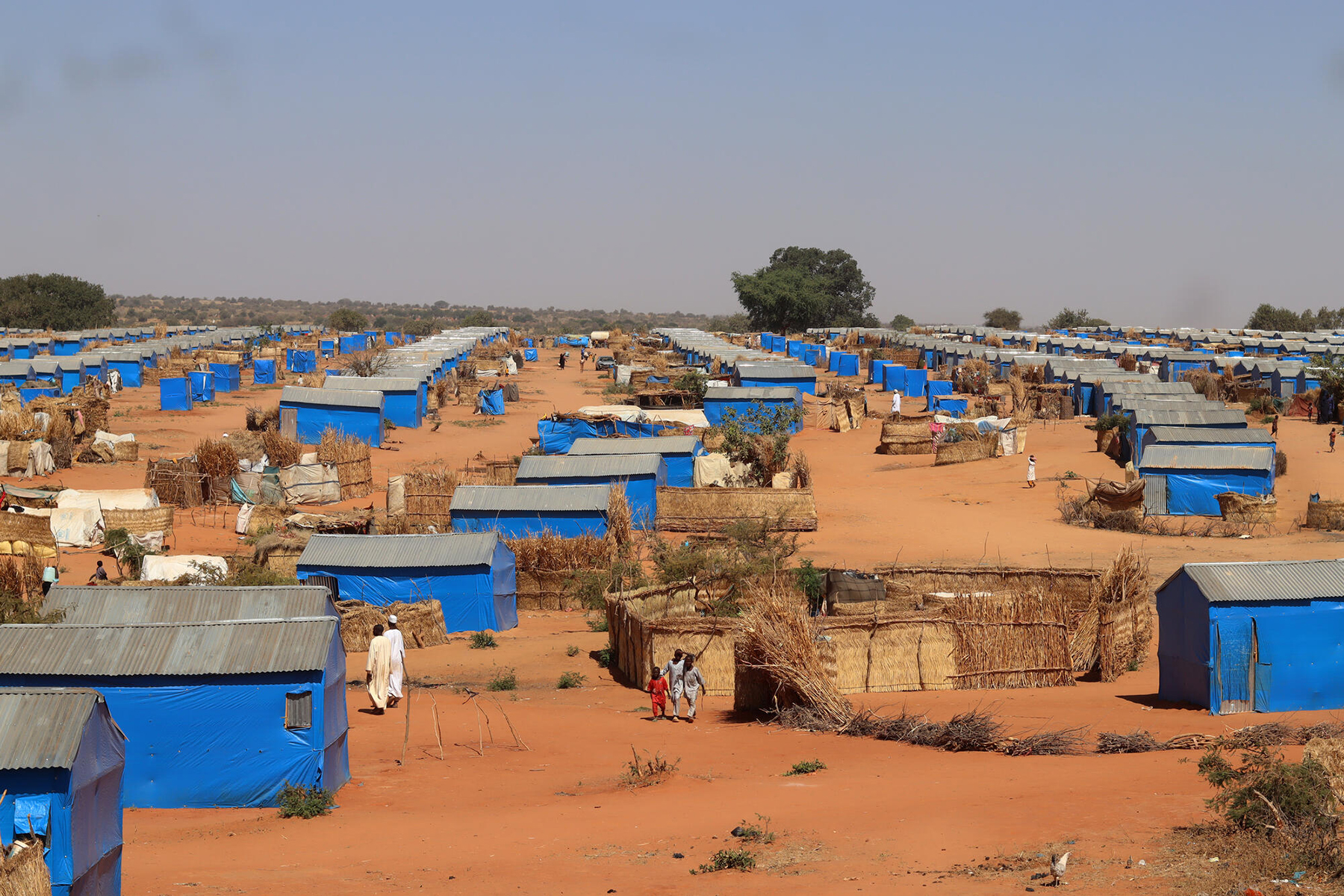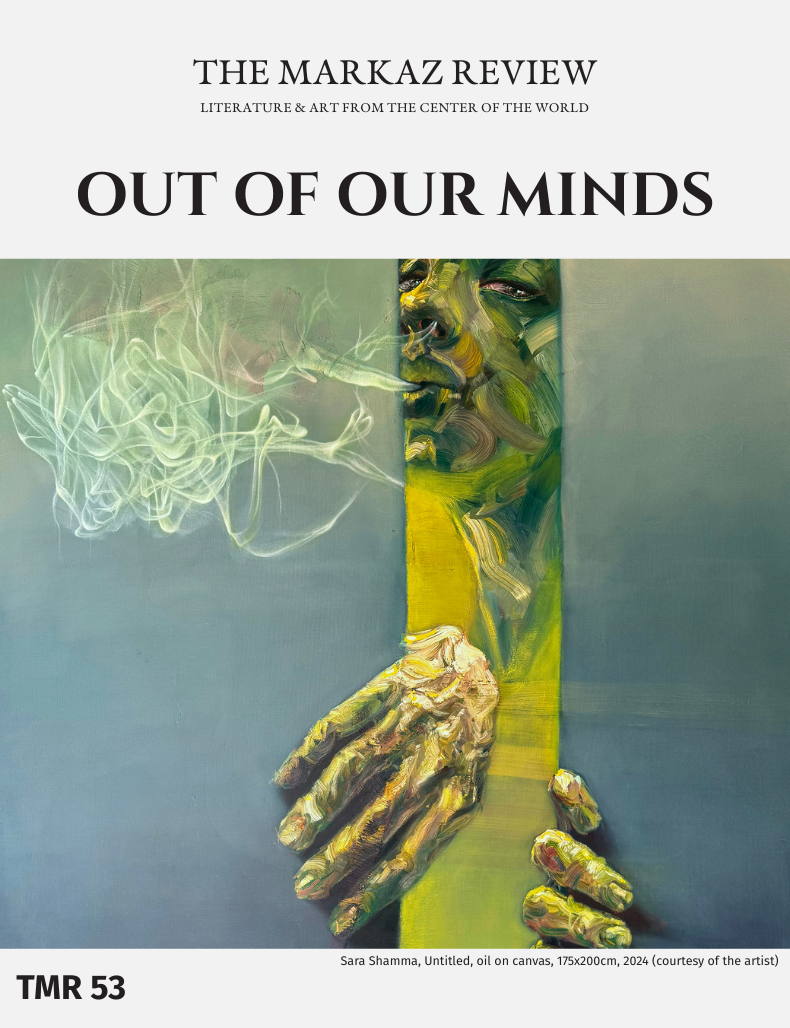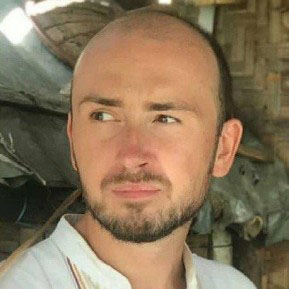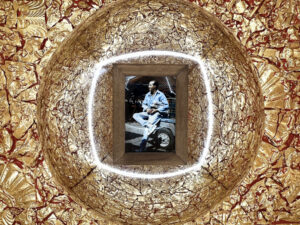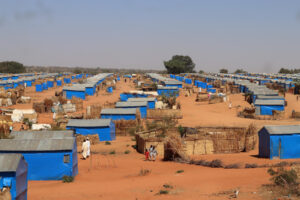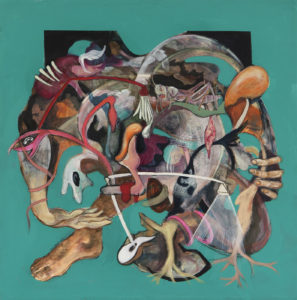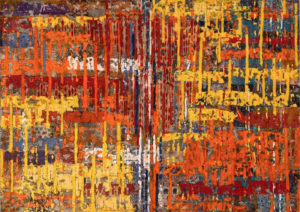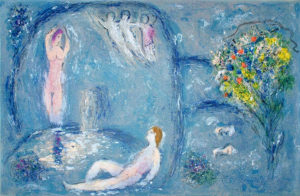I spoke with Maab L., a Sudanese mental-health worker now living abroad, who runs improvised psychological first-aid sessions for people trapped inside Sudan’s war. Once a volunteer with the Bahri Emergency Room in Khartoum, she now counsels rape survivors, displaced families, and even fighters through WhatsApp and Telegram. Her work raises a difficult question: in a country where trauma never ends, is “madness” an illness — or the only sane response?
The body forgets to sleep.
It lies awake in a hut stitched from tarpaulin and nylon, ears straining against silence. Silence, here, isn’t peace — it’s suspense. The breath before the airstrike. The pause between raids. You count your ribs with your fingers and remember your cousin’s name but not the date. No one knows what day it is in Arkoum anymore. Time was shelled with the last schoolhouse.
There’s a woman a few tents away who hasn’t spoken since the border crossing. Her daughter was taken before they reached Adré, a town on the border with Chad. Some say she sings at night, softly, to herself. Others say she just stares at the sand.
And then there’s Maab.
She answers phones from inside a shadow. Not just anyone’s phones — those of the broken, the hunted, the guilt-stricken. From a hidden location abroad, Maab offers psychological first aid to survivors still stuck inside Sudan. Across Sudan’s borders, in refugee camps and bombed cities, thousands live through unimaginable loss.
Over 1.5 million Sudanese have fled since April 2023, many arriving in places like eastern Chad with no food, no shelter, no names for what they feel. But what if our framing of mental illness is an illusion?
She calls it “holding space for their madness.”
She has no funding. No office. No protection.
Just a cracked smartphone and a Facebook page linked to the Bahri Emergency Room.
Grief
The word “trauma” has grown thin. It fails to hold the weight of a woman who watched her house collapse with her sons inside. It cannot contain the eyes of men who dig shallow graves for strangers because no one else will. Trauma suggests a moment, a before and after. But in Sudan, the horror is ongoing, unpaused, recursive. What name do you give to something that won’t stop?
In makeshift clinics and WhatsApp support groups, mental health volunteers like Maab are learning to speak a new language. One that doesn’t presume recovery. One that doesn’t impose the word resilience like a stamp of approval.
“People don’t want to be told to be strong,” Maab says. “They just want to not be alone.”
Her clients include rape survivors from Gezira, IDPs from Bahri, even militia fighters trying to sleep. She sends them breathing exercises when the internet allows, short voice notes recorded under a mosquito net: “Your pain is not a mistake. Your breakdown is not betrayal.” Sometimes she never hears back.
In Sudanese culture, there is strength in not speaking. Men are especially good at this. Maab has seen it too many times — grief buried under jokes, under religious phrases, under stubborn silence. But she knows what unspoken grief does. “It chews at you,” she says. “And eventually, it comes out in ways you can’t control.”
The sanity of collapse
In the West, madness is a failure of the mind. A disorder to be corrected. An aberration from the statistical curve of acceptable behavior. It is medicalized, medicated, made quiet. But what if that curve was always a lie?
In Sudan, reality is an open wound. Logic disintegrates at checkpoints. Time is not linear, and safety is fiction. “Madness” here isn’t an interruption of life — it is life. Or rather, it is the only response that makes any moral sense.
“If you saw what I saw,” one young man in Port Sudan told Maab, “you would question why anyone is still sane.” He wasn’t speaking metaphorically. His uncle’s body had been used to threaten the rest of the family. The killers returned two days later to ask if they’d received the message.
We call it PTSD, but what happens when the trauma is ongoing? What happens when the war enters its second year and you still haven’t found your brother’s body? When you still smell the sulfur in your food and your children dream of militia boots? Can there even be “post” trauma when the future has collapsed?
Maab doesn’t pretend to have answers. She works in fragments.
One day she listens to a woman describe the taste of rape. The next, she sends breathing techniques to a teenager hallucinating gunfire. Sometimes she simply sits with someone as they cry. There are no goals in these sessions — only presence.
“Western models tell us that healing is linear,” she says. “That we move through stages — shock, grief, acceptance. But I see people circle these feelings like a whirlpool. And sometimes, they go under.”
She’s read the NGOs’ training manuals. She knows the buzzwords “resilience,” “community-based coping,” “psychosocial scaling.” But the manuals don’t account for what happens when the very concept of a future is gone. “They want us to be stable,” she says. “But why? So we can return to a stable nightmare?”
What does breaking mean?
One night, Maab received a call from a former midwife. The woman had delivered babies in Darfur for twenty years. Now she could barely speak. Her village had been burned. Her daughters were missing. She had found a dog chewing on an infant’s hand.
She didn’t want therapy. She didn’t want closure.
She wanted to scream without being institutionalized.
This, Maab thinks, is what the world misunderstands.
That sometimes, to go mad is not to lose yourself — but to stop lying to yourself.
To admit the world is unbearable. That death has become architecture. That no amount of breathing exercises will make your house grow back.
In this way, madness is clarity. A refusal to conform to illusions.
It is not illness. It is intelligence in crisis.
If the world were sane
In Sudanese folktales, madness was not always pathology. It was often a sign. A curse, perhaps, or a warning. In some stories, madmen walked through villages speaking truths no one else dared voice. They were feared, yes, but also respected. Because they saw.
In Sufi cosmology, madness was sometimes a veil — a way to see what others refused to look at. A dervish spinning in ecstasy, a prophet exiled to the desert, a widow who speaks to the dead. Madness wasn’t exile. It was return.
Today, in the camps and crumbled towns, those ancient myths feel strangely contemporary…
A sheikh gone mad might speak in riddles. A woman talking to rivers might be touched by djinn. But no one assumed their minds were broken. The world, perhaps, had broken around them.
Today, again…. People wander in shock, muttering. Women sing to invisible children. A young man in Kassala wears his brother’s uniform every day, waiting for a body that will not return. These aren’t clinical cases. These are stories no one should have to carry.
“We say ‘!خلاص’ a lot,” Maab says. “It means: enough, it’s over. But it also means: I can’t feel anymore.”
She hears this word from men who used to organize protests. From women who used to run kitchens for the resistance.
“I don’t think they’re sick,” she says. “I think they’re speaking the truth.”
Because how else do you survive the grotesque absurdity of war — where the Rapid Support Forces demand allegiance and then burn the house they slept in? Where neighbors turn into looters and no one calls it betrayal, because betrayal is now strategy? Where the absence of gunfire feels suspicious, not safe?
So she asks:
If the world were sane, would we still call this madness?
Healing: not hope
Amid this collapse, there are still gestures. Small ones. A shared phone battery. A borrowed SIM card. A water jug carried across a checkpoint. These are not acts of hope. Hope, too, has become a lie.
These are acts of presence. Of staying. Of saying: you haven’t vanished yet.
Maab helps organize support threads for displaced Sudanese on Telegram. The chats go dead for days — then flood again with voice notes, crying, prayers. Sometimes someone shares a Sufi poem. Or a grandmother’s lullaby. Memory, too, becomes a kind of medicine.
“In our culture, we talk to the dead,” Maab says. “We ask for guidance. We believe the soul doesn’t leave right away. That it lingers.”
So sometimes she asks her clients: “Who do you talk to when it’s unbearable?”
And the answers come:
“My mother.”
“The river behind our house.”
“No one. I just whisper into the night.”
She believes healing might start here — not with diagnosis or pills, but with permission.
Permission to break.
To not be okay.
To mourn out loud.
Vocabulary
In the camps, people don’t ask, How are you? They ask, Are you still there?
A mother might answer by showing her son’s sandals. A boy might respond by handing you a cracked photo. Presence is not assumed here — it must be proven.
Maab continues her sessions through low-signal calls and WhatsApp threads that flicker like candlelight. She still receives messages from inside Khartoum, from Wad Madani, from places where aid cannot reach but grief always does.
And she listens.
Sometimes she teaches clients to breathe with their hands on their chests, to name the colors in their rooms. But often, she just waits. She’s learned that in trauma, silence is not absence — it’s survival.
“I don’t tell people to get better,” she says. “I ask them what they can carry today. Even if it’s only their own name.”
Outside formal therapy, mental health remains coded in Sudanese daily life — in hakamat chants, in tea circle gossip, in the Sufi dervish’s spin. These rituals hold more than cultural value. They are systems of release. Ways to scream without making a sound.
No one is coming
There’s a line Maab no longer says: Help is on the way.
She stopped saying it when the ceasefires failed.
When the international community looked away.
When refugee camps swelled and Sudan became another headline people forgot how to pronounce.
Instead, she says:
“We’re the ones we have.”
It’s not meant to inspire. It’s a fact.
What if madness isn’t a crisis? What if it’s an inheritance? A form of knowledge passed down in stories that no longer fit on aid reports? What if the women whispering into the dark are not broken — but tuned in to a frequency the world has chosen to ignore?
Why wouldn’t we go mad?
And so this ends where it began.
Not with resolution.
Not with strength.
But with a question that refuses to be answered.
When all that is sane has crumbled and passed,
When truth wears the mask of a lunatic’s cast,
When survival feels twisted, cruel, and unclean—
Then madness may not be the foe it may seem.



